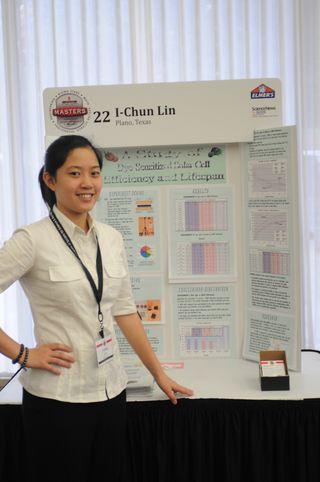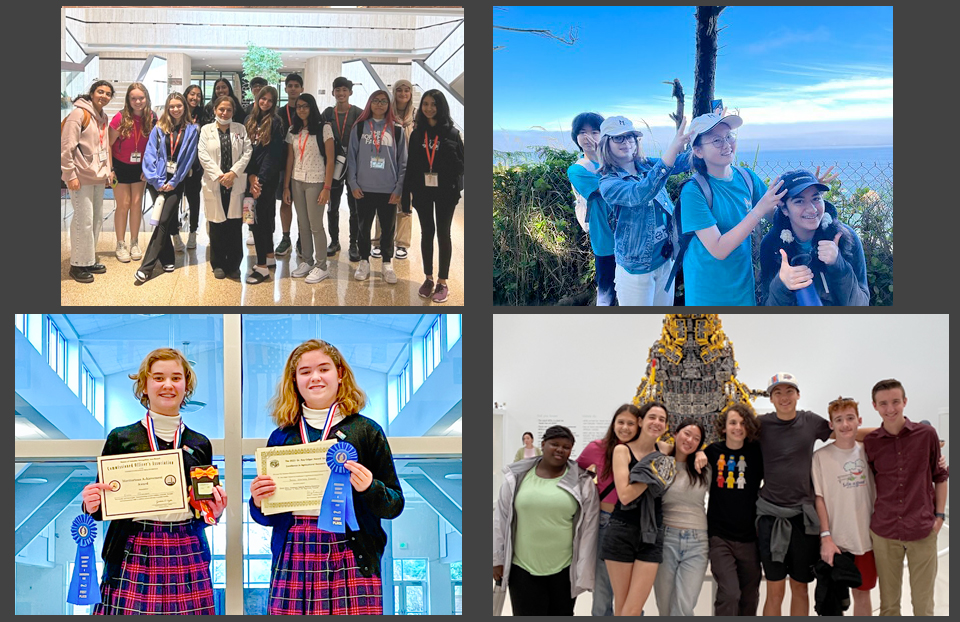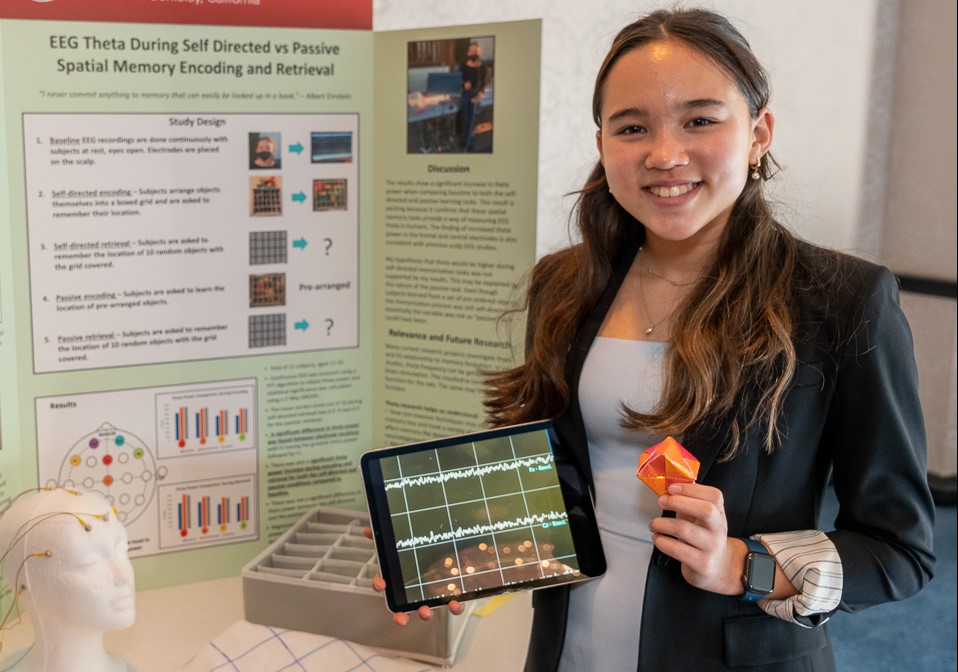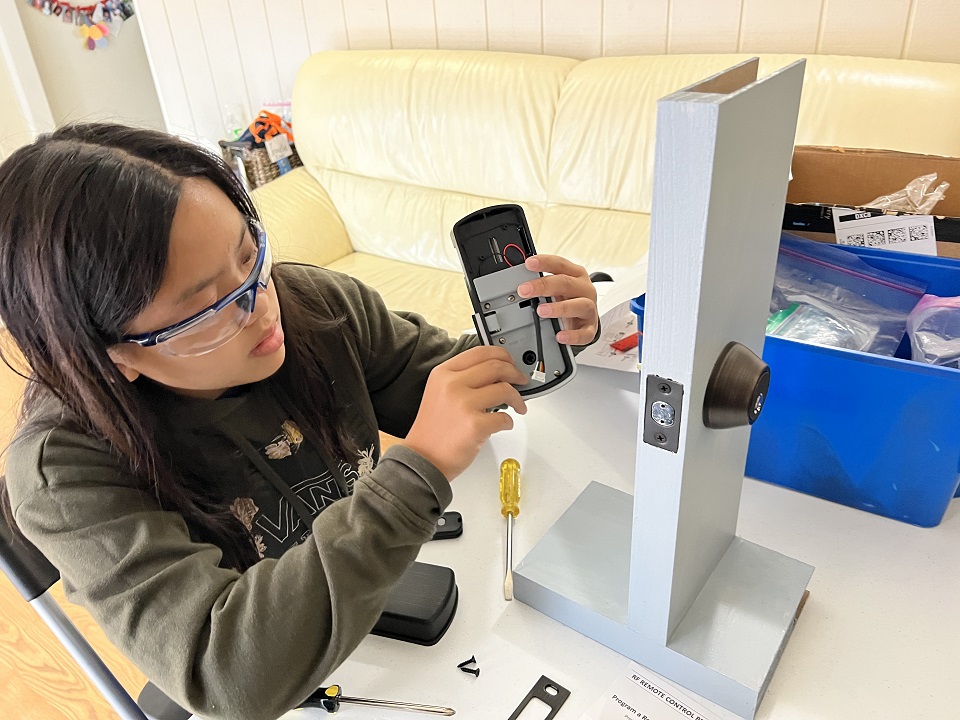Broadcom MASTERS 2011 Finalist I-Chun Lin Advises Young Scientists
I-Chun Lin from Plano, Texas was the 3rd place winner at the 2011 Broadcom MASTERS® (Math, Applied Science, Technology, and Engineering for Rising Stars), a program of Society for Science & the Public. Below she describes her experience as a finalist and advises middle school students interested in science not to be afraid to explore their passions. Broadcom MASTERS is the national science, technology, engineering, and math competition for 6th-8th grade students in the United States. Broadcom MASTERS 2012 finalists will be announced in August

I would like to begin by stating my thanks to Broadcom and the Society for Science & the Public for making the Broadcom MASTERS a possibility. The competition was exciting, the food was amazing, the souvenirs were great, and the entire trip was just an incredible experience. In addition, I would like to express my gratitude to Exxon Mobile for funding the Texas State Science Fair, and for the various sponsors that helped at the regional and school levels. Without this support, I would not have been selected to be a 2011 Broadcom MASTERS finalist.
Through this competition, I was able to get acquainted with STEM (science, engineering, technology, and math) principles in a way that I haven’t been able to through school. In an exciting, hands-on adventure, I made new friends and learned new ways to innovate and improve technologies. I also learned the value of teamwork and friendship. The entire competition was an incredible opportunity that I am extremely thankful for, and I am very proud to have been included in the pioneer group of competitors.
During Broadcom MASTERS, I presented my research project, ‘A Study of Dye-Sensitized Solar Cell Efficiency and Lifespan.’ I originally became interested in green energy and solar energy specifically, by reading Popular Science and other science innovation magazines and websites. Due to the high cost of conventional silicon-based solar cells, I conducted further research and found a cheaper alternative, the DSSC. The DSSC is based on a natural anthocyanin dye, as opposed to silicon. In my project, two distinct sets of experiments were conducted: 1) manipulating the dye color to test the cell efficiency and 2) adding a sealant to the cells to test overall efficiency and lifespan effects.
I have been participating in science fairs since kindergarten, and have placed at the regional and state levels several times. In the beginning, pressure from my parents motivated me to do well in school science fairs. However, I have grown to love the thrill of learning something new that’s not structured through school curriculum. In addition, being able to conduct my own research on a topic that I am interested in and presenting the information is a refreshing method of letting my competitive nature shine.
A few words of advice to young students interested in science:
*Just do it. As Nike, a mega-brand of athletic apparel, labels many of its products, just do it. If you feel passionate about something, if you feel a spark of something creative, go for it. Even if you only feel mildly interested in a topic, don’t hesitate to read more about it. Simply clicking on a link might lead to more than you could imagine.
*Science isn’t geeky. Science isn’t nerdy. Science is the future. You might think this is cliché, but it’s true. If you want to be a scientist, or a doctor, or an engineer, don’t shy away from it because of what your friends might think. Do it because you want to, and be proud of whatever you choose. Participating in science fairs is just the start, but it opens doors to many roads.
*It’s okay to make mistakes. Everyone does. Whether it’s a failed experiment or accidentally blowing up your garage (though that’s a bit dangerous), just remember that somewhere else, someone is also causing a mini-mushroom cloud in their backyard. Just pick yourself up, dust yourself off, and continue doing what you love.
To applicants:
*Don’t procrastinate. Start early.
*Split the work up. You don’t want to wear yourself out doing too many questions at once. Pace yourself, and just do a few at a time.
*If might be helpful to copy the questions onto a Word document, and construct your answers there. When you finish finalizing, copy the answer back onto the online document. You don’t have to copy all of them at once. Remember that the site saves your work.
*The application might be long and tedious, but the rewards will be great. Don’t give up, and put your all into it. As a finalist, I am very happy that I didn’t give in to the temptation of quitting. The experience was more than worth the effort of applying.
To finalists participating in this year’s events:
*Don’t feel like you’re competing because someone told you to. I would know; I’ve been through that. As a matter of fact, don’t treat this as a competition. Treat this as an outlet for your scientific journey, a way for you to share what you’ve spent so much time learning and researching and creating. You are the expert on your project, and no one can tell you otherwise.
*Don’t spend so much time focused on winning that you forget to have a good time. Broadcom MASTERS isn’t just about presentation. It’s also about teamwork and passion. Take the time to make friends and have fun.
*Lastly, congratulations! From a pool of good projects across the nation, I am sure that yours must be outstanding to have been selected. Be thankful for this opportunity. Out of thousands of nominees, you were chosen. Enjoy this amazing trip, and cherish the experience.
Again, I would like to thank Broadcom and the Society for Science & the Public for providing this competition for young scientists, and allowing me this opportunity to share my experience and advice with future innovators. Good luck!


